Freedom Suite:
Transaction Being Processed
.
If education is a process of becoming, Freedom Suite: Transaction Being Processed examines education in a series of formative moments and their shuffling that inform the present. Based on the experiences of South African youth activists from New Brighton, Port Elizabeth in the 1980s, this dance theatre work reflects on personal and historical moments of political and social consciousness that happen in adolescence, and their relationship to now. Using foundational vocabularies of contact improvisation, dance theatre, and the transmogrification of school chairs, Freedom Suite: Transaction Being Processed reflects on transference, education, and intergenerational transmission at a time when many former youth activists are asking themselves: what was it I and we were fighting for? Given the recent political context of student protests met with police violence in South Africa (and resonance with current activism in the US), this piece offers the stage not as trial, but as Rorschach portrait inquiry: a doorway of genealogical reflection on aspirations, education and freedom.
.
Freedom Suite: Transaction Being Processed
Direction and research: Eryn Rosenthal
Movement and performance: Jennifer Harge and Eryn Rosenthal
Choreography: Eryn Rosenthal, in collaboration with Jennifer Harge
Education and Community Engagement: Thabang Queench, Centre for the Advancement of Non-Racialism and Democracy (CANRAD), Nelson Mandela Metropolitan University, Port Elizabeth, South Africa
Costumes: Michaela Tanksley
Music: Gabisile Motuba and the Trip
Soundscore: Dylan Greene
Pre-show Kafka vestibule entry questioner: Kevin Goodman (Lauren Fitzgerald 3/28)
Dramaturgy: Kevin Goodman, Efrén Cruz Cortés, Bubu Mazibuko, Dylan Greene and Christine Crow
Co-production: The Doors Project and Goode Productions
.
This performance is inspired by ongoing research and collaboration with artists and activists from South Africa, many of whom were involved in different aspects of the anti-Apartheid Struggle as youth activists in the 1980’s. I am deeply humbled and grateful to the SA activists and artists who have shared their stories and reflections with me, especially to Zolani “Whawha” Gaxamba, Mila Koltana, Mlamli Tsotsi, Tando Nyati, and Pat Thando Kondile. I am also indebted to SA scholars and activists Yazier Henry and Heidi Grunebaum for their seminal research on post-Apartheid and post-TRC (Truth and Reconciliation Commission) memory and trauma, and the psycho-geographies of displacement, war and genocide. An Artistic Activism workshop with US artist Steve Lambert was also central to the development of this piece.
The first iteration of Freedom Suite: Transaction Being Processed premiered as part of Wishes, Lies, and Dreams*, a thesis concert for Masters in Fine Arts candidates Eryn Rosenthal and Patty L. Solórzano on March 26-28, 2015. Performances took place at the Betty Pease Studio Theatre at the University of Michigan Department of Dance, Ann Arbor, Michigan, USA. Heartfelt thanks to the U-M Dance Department and my dedicated thesis committee: Professors Amy Chavasse, Maria Cotera, and Jessica Fogel.
* Wishes, Lies, and Dreams: Teaching Children to Write Poetry is a collection of children’s poems from 1969-70 by Kenneth Koch and the students at PS61 in New York City.
.
Funding:
The research, creation and performance of the first phase of Freedom Suite: Transaction Being Processed has been made possible through the generous support of the African Studies Center and the Rackham International Research Award of the University of Michigan, the Goode Family Foundation, the International Institute Individual Fellowship (U-M), the Alvin and Louise Myerberg Family Foundation, The South African Initiatives Office (U-M), the Department of Dance (U-M), and the Rackham Research Fund (U-M). Original fellowship research in 1998-99 was supported by a President’s Grant from the Open Society Institute and the Henry Hart Rice Foreign Residence Fellowship of Yale University.
I am also grateful to the Lee family and the Center for the Education of Women for their generous support, and am honored to have been named the 2014-15 Elsie Choy Lee Scholar.
.
Photos by Andrea Rivera and Philip Louis Wachowiak:
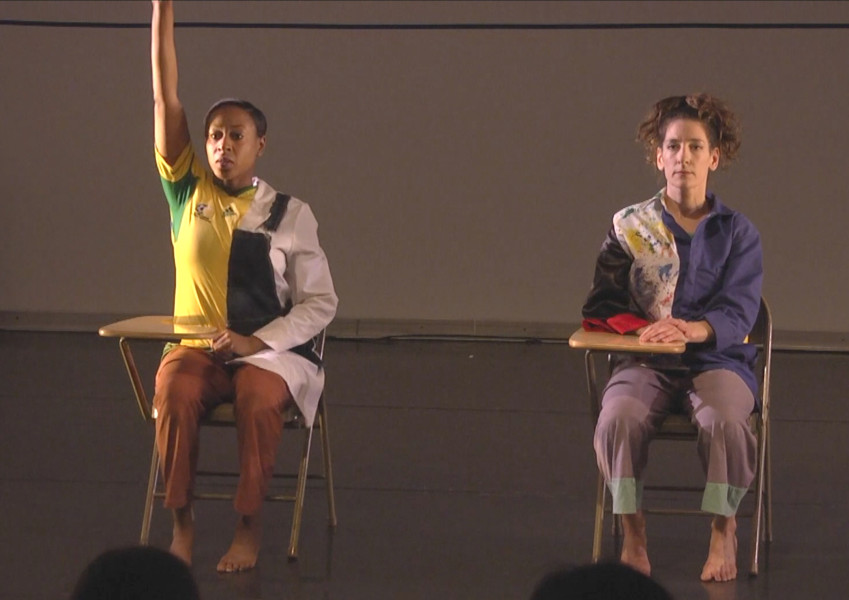
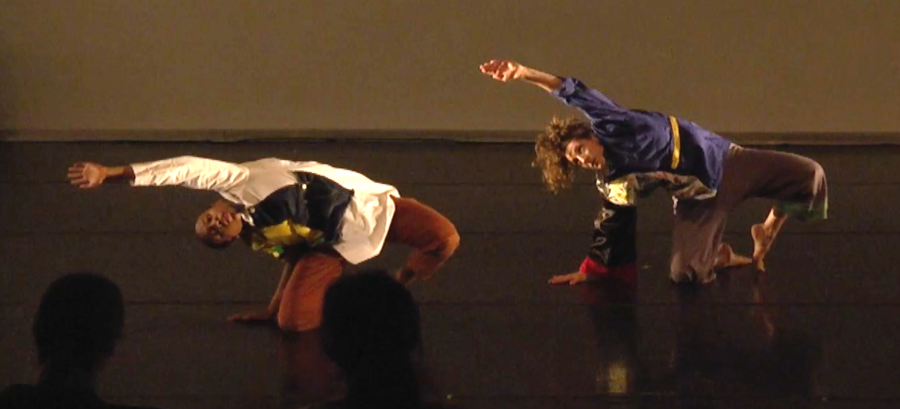
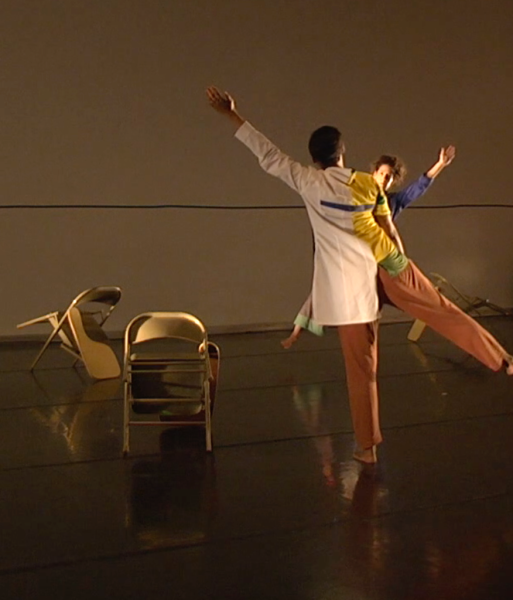

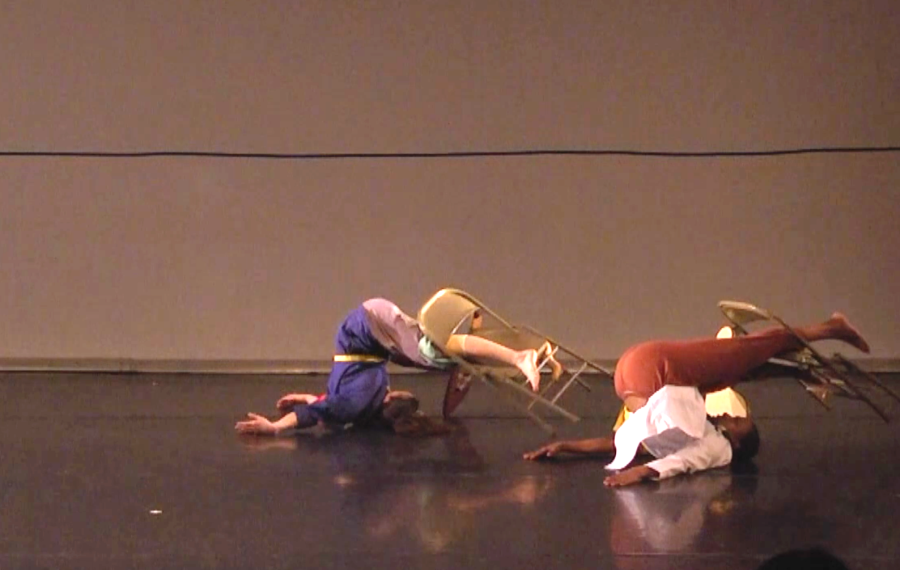
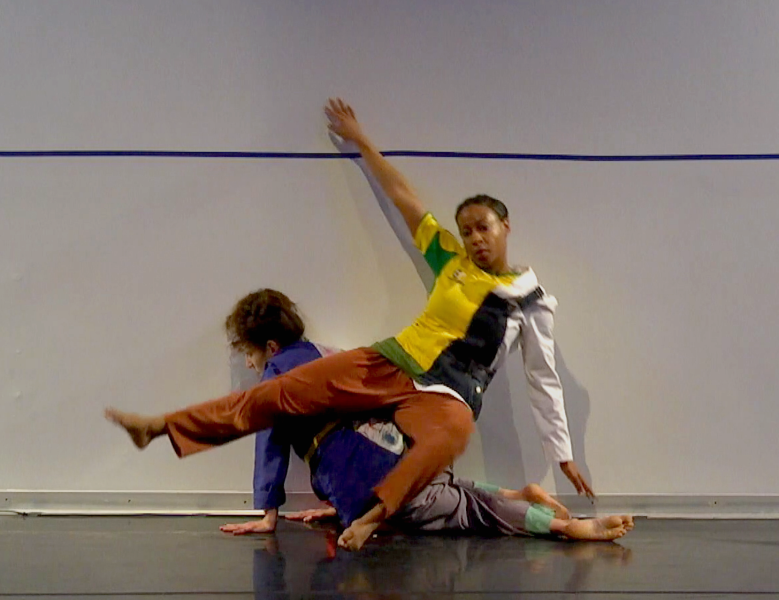

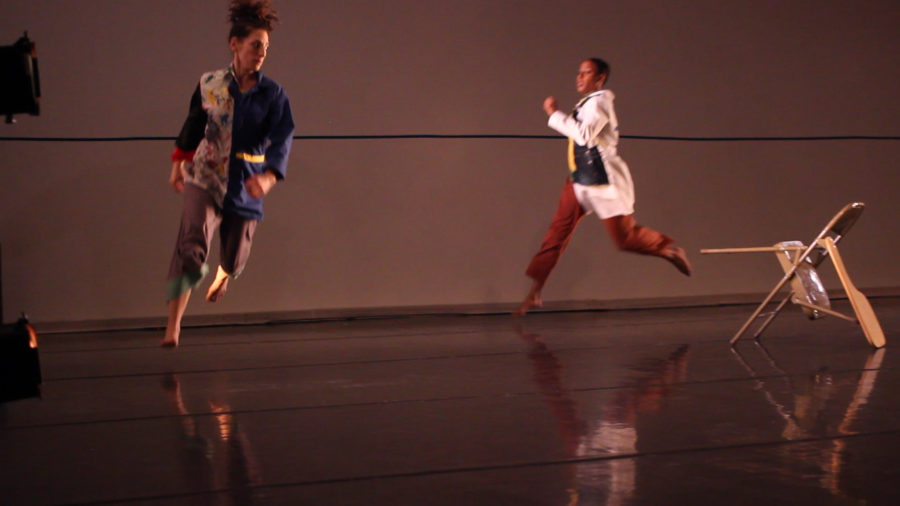
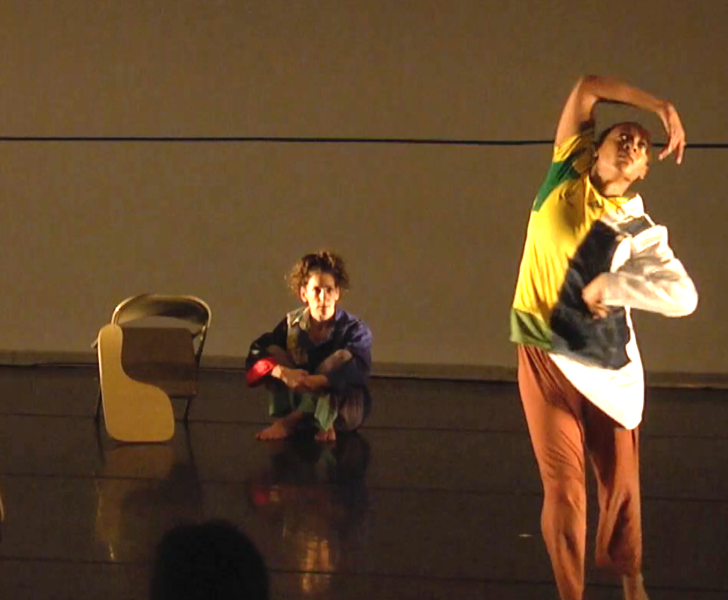

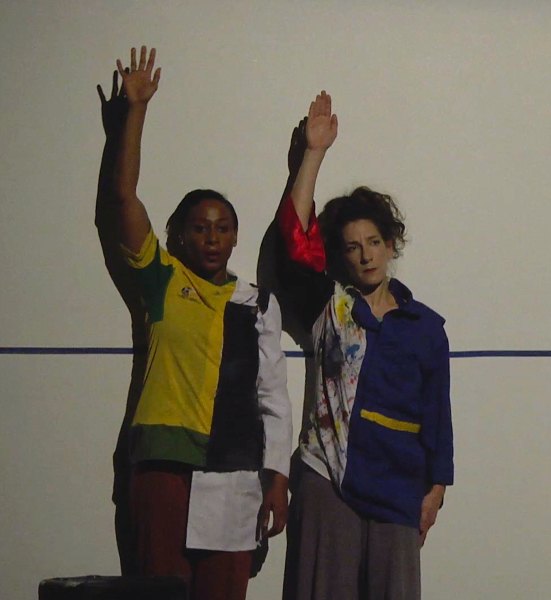
.
Videos by Andrea Rivera
.
Freedom Suite: Transaction Being Processed
(chairs excerpt; 5min 29sec)
What you will see in the video excerpt below was Scene 2 of Freedom Suite. What you will hear in the soundscore are excerpts and interruptions from a historical timeline of national events in South African history from March 1985, 30 years prior to our performance. The events are read by the two performers, Jennifer Harge and Eryn Rosenthal. The percussive radio jingle signature of Radio Freedom you will hear is real (several activists I spoke with recalled the excitement that hearing the jingle provoked and the importance for them of Radio Freedom), but its direct juxtaposition with this timeline read by two Americans is not.
.
Freedom Suite: Transaction Being Processed
(in-process workshop premiere)
Note: we played throughout the work with the question of beginning. As you can read more about below, many would say the piece really “opened” in the vestibule before entering the theater, where viewers were buying or retrieving their tickets and had to answer a series of absurd questions in order to enter the threshold of the theater. Excerpts from these vestibule interactions can be found at the beginning of the full-length video, below.
Special thanks as well to Cape Town hip-hop artist Emile YX?, who gave us permission to screen his music video before our performance to give context to our Michigan audience, many of whom had been born after the legislative defeat of Apartheid in 1994.
Butterflies Fly By Video and song: EmileYX?
Onscreen poetry: James Matthews (ed. EmileYX?)
Additional video footage by Beverly Mitchell
Song recorded in Cape Town, South Africa, 2014
Screened with permission
www.healthehood.org.za
Warning: this video contains graphic images.
.
Music Credits
Section 1: Rorschach
“Umkhonto” by University of the Western Cape Creative Arts Society Choir (Making Music Productions, 2000).
Song translation by Nkosi Booi available on request.
Section 2: Chairs
Text: Adapted from sahistory.org.za, Wikipedia, the Truth and Reconciliation Commission (justice.gov.za), and You have been warned: The first ten years of the Mail & Guardian, ed. Irwin Manoim (Viking Penguin, Sandton, South Africa; 1996).
Text editing and cutting: Eryn Rosenthal
Soundscore: Dylan Greene
Voice: Jennifer Harge and Eryn Rosenthal
Section 3: Weather Patterns
“War Cry” by Gabisile Motuba and The Trip
Vocalist, Composer and Arranger: Gabisile Motuba
Drums: Tumi Mogorosi
Double Bass: Ariel Zamonsky
Guitar: Nelius Nortje
Recorded live for this performance in Pretoria, South Africa, March 2015.
Section 4: Khawuleza
Music: “Hurry, Mama, Hurry (Khawuleza)” by Miriam Makeba (An Evening with Harry Belafonte and Miriam Makeba, RCA Records, 1965)
Section 5: Space Between
Music: “Sky” by Gabisile Motuba and The Trip (see credits above)
Section 6: Timeline
.
.
How did it start?
.
Excerpt from “Exit/Entrance Interview— Freedom Suite: Transaction Being Processed”
by Eryn Rosenthal (2015)
In Jan. 2014, I was narrowing the focus of my thesis research, which I was considering focusing on former youth activists from the tight-knit community of New Brighton, South Africa. (New Brighton is known as a small but mighty artistic and activist hub—home of the Mbeki family and other political leaders of the African National Congress (ANC) and other anti-Apartheid movements, as well as the Serpent Players, the theatrical group which conscientized many in South Africa, England and the US with the award-winning Sizwe Bansi Is Dead and The Island in the 70s). I spoke with my friend Zolani “Whawha” Gaxamba, whose shared memories of youth activism and community in the anti-Apartheid Struggle in New Brighton during our interviews in 1999/2010 had inspired this idea. Could a focus on New Brighton be of use or interest to him and other folks there, did he think? My question was met with an emphatic Yes, for several reasons. He and many of his friends, former youth activists in New Brighton, reported feeling passed over in national narrative-building of the Struggle; many were also starting to feel strong historical imperatives to tell their stories, coupled with challenges in bridging generational divides with “born-frees” (including their children, nephews and nieces); and conflicting desires not to upset others with painful stories of torture, humiliation and “the past.”
Whawha and I decided to focus the interviews of my thesis research with five former youth activist friends who became involved in different anti-Apartheid movements in the 1980s in New Brighton. There is a long history of youth activism in South Africa, and in New Brighton and the Eastern Cape in particular; youth activism became even more pronounced after a series of nationwide protests that included the Soweto Uprising in June 1976. Each of these friends’ educations, both formal and informal, involved multiple interruptions: starts and restarts due to arrests, school boycotts (some lasting over two years!), and for most of them at some point, leaving New Brighton or even the country. The form of the performance, then, likewise, involves multiple interruptions, starts, and restarts of different textures: some more stark “drops” of the action or breaks in character, and other interruptions that are a bit more fluid in their transitions.
My performance collaborator Jennifer Harge and I were also examining the subtle transitions, starts and restarts of how our presence might be interpreted in different ways by audience members. Are we the same two characters throughout? Are we historical figures? Are we representatives of a post-democratic fantasy? What are two U.S. citizens doing making a work about South Africa, and what is our relationship to the subject matter we are engaging with, and with each other?
I decided to focus on questions of initiation and consciousness for the activists I spoke with in part because I was thinking ahead to questions of education and initiation for my thesis audience in Ann Arbor, Michigan. I knew that many of the members of my U.S. audience might not know many details about the anti-Apartheid movements in South Africa, nor much about current events there twenty years after the first democratic elections. –But also, as several South African activists have told me, many young South Africans don’t know what it was like living through Apartheid either—there’s a big generational divide among what’s become known as “born frees”—children who were born after Apartheid was legislatively defeated in 1994. So these questions of initiation and consciousness—“how did you become involved?”—took on wider significance, perhaps protagonism, even, in the building of this work. A focus on these questions also led, organically, to questions of empathy—what would I have done in their shoes? —for both my collaborators and myself. Many audience members commented on the reflection provoked for them around these questions, which was one of my goals in this performance: to provoke reflection and extend these questions a level further, toward my audience.
These post-trauma questions and the distance they reveal are present both in a generational as well as a locational sense in this work, inherent in the fact that I am asking these questions as someone born later and from somewhere else than the youth activists who spoke with me about their experiences in different liberation movements in South Africa. There are a number of other important differences to note as well: gender, ethnicity, religion, class background, occupational training, and combat experience, to name a few. As Anna Deavere Smith discusses in the introduction to Fires in the Mirror: Crown Heights, Brooklyn, and Other Identities, however, the presence of these differences and the empathic, bridging act of imaginatively building connection through/despite it, is what continues to intrigue me and open doors for me within this work.
Returning to South Africa* after our Michigan performances, I shared video of the performance with my collaborators and their families, as well as other former youth activists and freedom fighters. I was very moved to hear how moving and “unblocking” the performance was for them; and to learn of the conversations, projects and further actions that our oral history process and the performance had inspired. Several of the activists with whom I spoke are also developing their memoirs from our oral history conversations.
* Freedom Suite was originally slated to have its South African premiere/full-length expansion at the Grahamstown National Arts Festival that next year, but they unfortunately lost their funding.
.
© Eryn Rosenthal, 2015-16, 2021. All Rights Reserved.